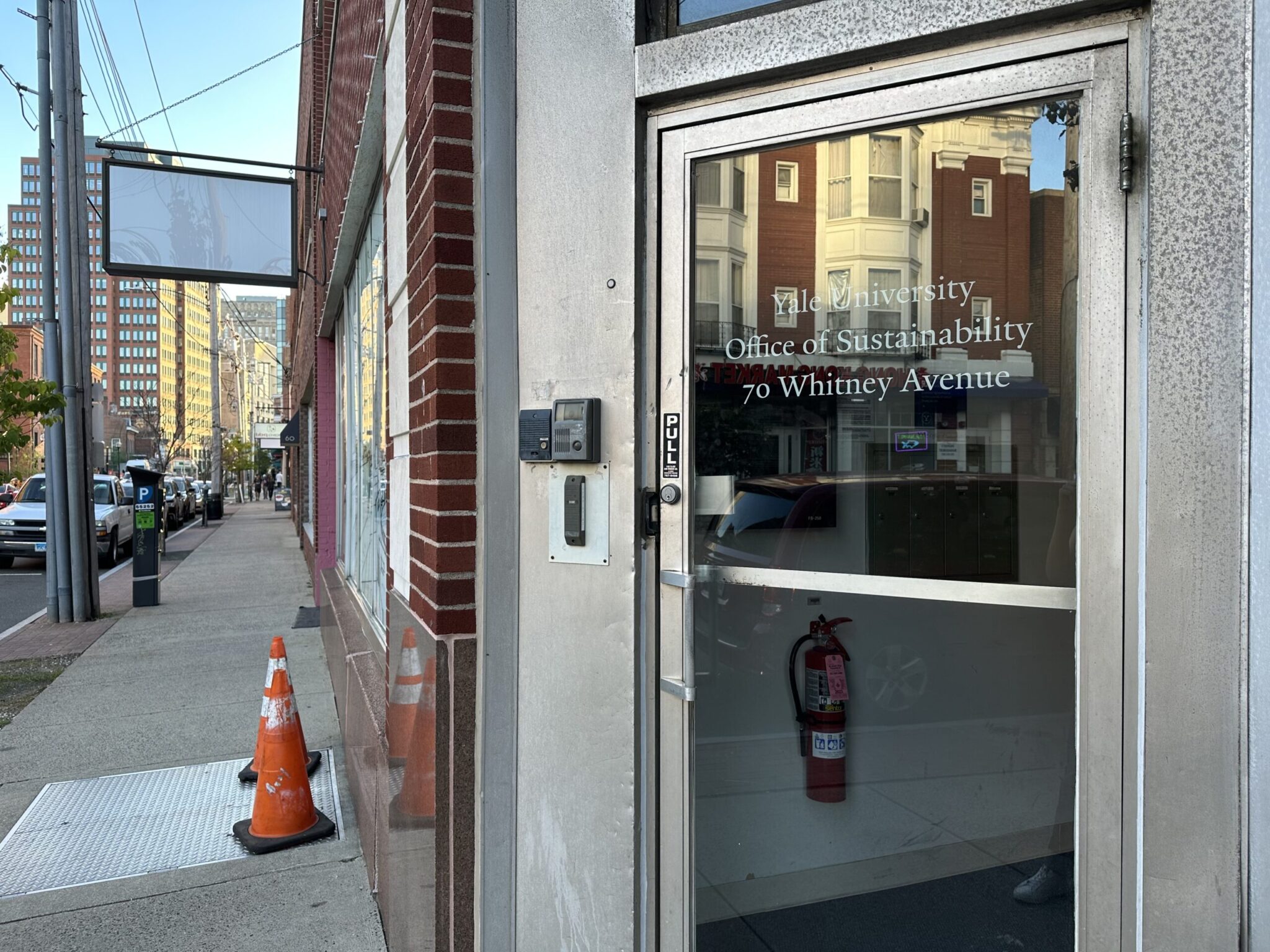Office of Sustainability centralizes peer liaison program
Starting this year, the sustainability peer liaison program is shifting from a residential college-level program to a centralized structure across the 14 colleges.

Katya Agrawal, Contributing Photographer
Student-led sustainability is getting a new look after the Office of Sustainability announced changes to its peer liaison program.
The sustainability peer liaison program — an effort that originally allowed student groups to pilot local sustainability projects across the University — has altered its structure so that efforts are no longer limited to individual residential college communities.
Under the new system, rebranded as the Sustainability Peer Education Program, sustainability liaisons will work in teams to address environmental issues around Yale’s campus at large.
“I am incredibly excited to see what the Sustainability Peer Education Program can accomplish,” Ciara Lonergan ’25, a sustainability peer liaison, wrote in an email to the News. “The restructuring allows student employees to focus on what they are interested in.”
According to Lonergan, the new peer education program will better guide current student-led sustainability efforts. Sustainability liaisons will continue performing their previous duties — conducting energy surveys, creating seasonal campaigns and auditing waste — but will do so by conducting specific projects in one of four teams.
Sustainability Engagement Manager at the Yale Office of Sustainability Maria Gutierrez told the News that sustainability liaisons have been divided into teams this year to enable sustainability liaisons to focus on their interests. The “Communications” group will focus on increasing the program’s outreach to the student body, while the “Green Certifications” group will work to communicate the University’s new sustainability standards.
Liaisons working with the “Zero-waste Initiatives” group will conduct waste audits and provide consultation for events, and those on the “Green Community” team will be responsible for planning programs and campus-wide events, according to Gutierrez.
Peyton Meyer ‘24, a former Timothy Dwight sustainability liaison and current Green Certifications team member, told the News that the centralization effort has also meant losing some of the community connection that the original program’s residential-college model created.
“I did enjoy how the program used to be tied to the residential colleges and miss doing work that most directly impacted my community,” Meyer ‘24 wrote in an email to the News.
Meyer added that he would have preferred a program still centered in the residential colleges, as he said that residential college community-level programs can provide a direct way to reach students. Yet, Meyer also recognized the potential difficulties in standardizing the previous program across the 14 residential colleges that each have their own facilities, students populations and traditions.
In an email to the News, Sebastian Duque ’24, former co-president of the Yale Student Environmental Coalition, said that the prior structure fueled the perception that liaisons had “little to no” agency to influence the Office of Sustainability’s work. While Duque was not a liaison for the Office of Sustainability, he told the News he observed that under the previous structure, most peer liaison activity was limited to running events at the college level.
Gutierrez said that the new program structure seeks to “create a strong sense of community” and develop a “Yale College-wide approach to sustainable action,” while strengthening the Office’s ties to the student body. Students in the cohort, she said, will attend monthly sessions to provide them with the “training and resources” needed to connect and communicate more effectively with the wider Yale community.
The restructuring came after discussions sustainability peer liaisons had with the Office of Sustainability at the end of last year. Lonergan, who was formerly a Morse College sustainability peer liaison, said that she and other liaisons had been feeling stretched thin between balancing the sustainability demands of their respective residential colleges and those of the Office of Sustainability.
As the communications team leader this year, Lonergan told the News she is looking forward to educating students about how they might incorporate eco-friendly practices into their own lives.
As a member of the Zero-waste team, Elise Wilkins ‘25 wrote in an email that she is excited to help share sustainable waste management practices with the student body.
“I think that student-led teams will be very beneficial for making sustainability accessible to students specifically,” Wilkins wrote to the News. “There is a lot of opportunity for collaboration across teams as well.”
Meanwhile, parts of the Office’s peer education program will remain connected to the residential colleges.
Gutierrez mentioned the importance of maintaining the “local connections” liaisons hold with their residential college communities. Much of the selection process for peer liaisons, according to Gutierrez, will continue to follow the existing model, where at least one representative is selected from each college. This year, a cohort of 16 students were selected from across the colleges to join the existing program.
Duque wrote that he hopes that the program’s new-look program might provide greater clarity to both the student body and the Office of Sustainability. He added that increased outreach programming will be crucial to carrying forward Yale’s sustainability commitments, especially in areas such as food waste.
“The restructuring is a prime example of Yale faculty working with students to create a program that ultimately improves the experiences of both parties,” wrote Lonergan.
The Yale Sustainability Office was established in 2005.







